Tbilisi and Davit Gareja
August 24, 2007
By Dan Murdoch
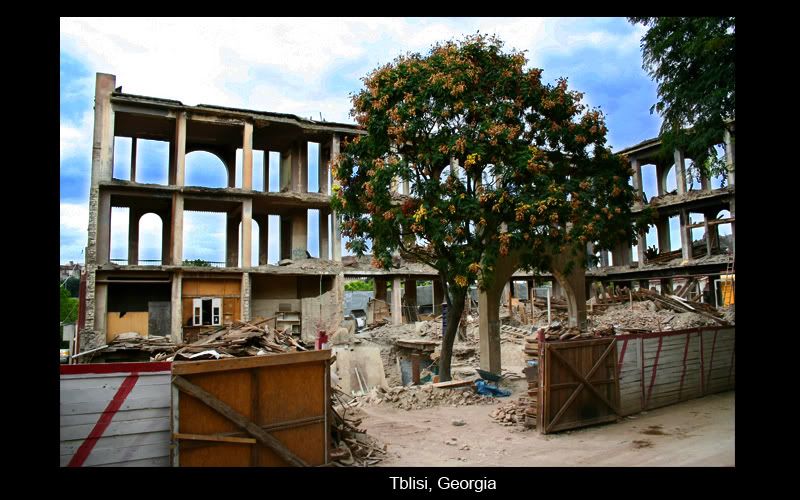
We left Tbilisi to head towards the Azeri border, which we hoped to cross before nightfall.
Vaguely along the way was Davit Gareja a famous old monastery out in the hills that we’d heard was worth a visit. Looking in our patchy guidebook map it looked like a short detour…
I guess England has its fair share of industrial wasteland. But on route we passed failed industry on an epic scale. Enormous factories with shattered windows and semi-collapsed roofs loomed up from the plains. Twisted metal, broken fencing and rusted pipes adorned the slumping ruins of Five Year Plans. Whole industrial towns left to rot.
But there was some activity in there. A long, straight chimney belched yellowish gas high into the atmosphere. Up close I hardly noticed the clouds, but from 50km away I looked back and saw that thick smog was lying over the whole area, all emanating from that one industrial minaret.
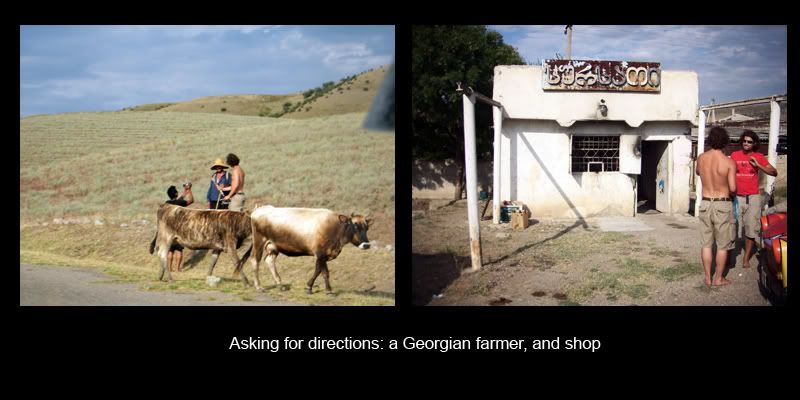
As we continued the view became more natural. The land turned to pastures, miles of fertile grazing, sandwiched between rolling mountains. Bright green foliage followed the basin of a once powerful river now reduced to a trickle, by nature or man I don’t know.
After stopping for directions at a strange shop, we turned off the main road onto dirt tracks that we would follow through the fields for the next three hours.
The mud paths were better suited to horse, cart and cattle. But the scenery was spectacular, we met some interesting shepherds along the way, and driving the Trabbis in those conditions was fun. The little machines handle like rally cars, and because they only go 50mph, you can try and drive them flat out, and laugh as they skid through the dust.
Our path was constantly blocked by herds, crossing the road in huge groups, like pedestrians in cities. One horse tried to race us, despite having its front legs bound loosely together to stop it running too far. It was a surreal moment, gunning the Trabbi across the dirt with a horse in full flight along side.
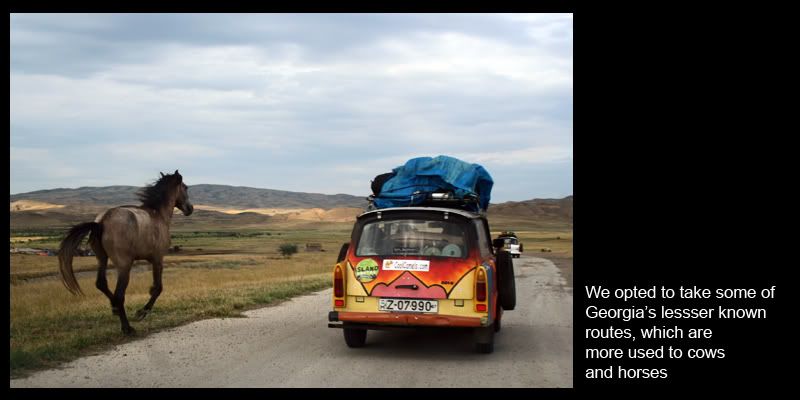
It was nearly nightfall when we arrived at Davit Gareja and the old monastery was locked up, so we scrambled up a steep rock face to try and get over the walls.
“So now you’re breaking into churches?” OJ asked, but after driving all that way we had to peek inside.
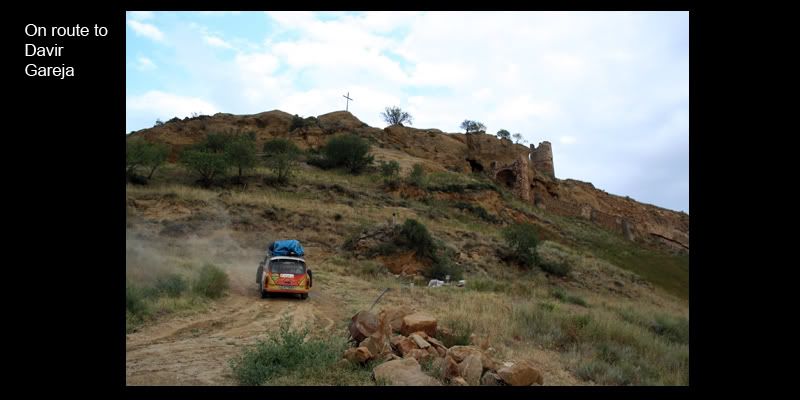
After half an hour of clambering about, a monk arrived and opened the doors. He asked us to cover up, then took us on a tour in the fading light.
The stunning and remote centre is carved out of the porous rock – a cave system surrounded by high walls and steep cliffs.
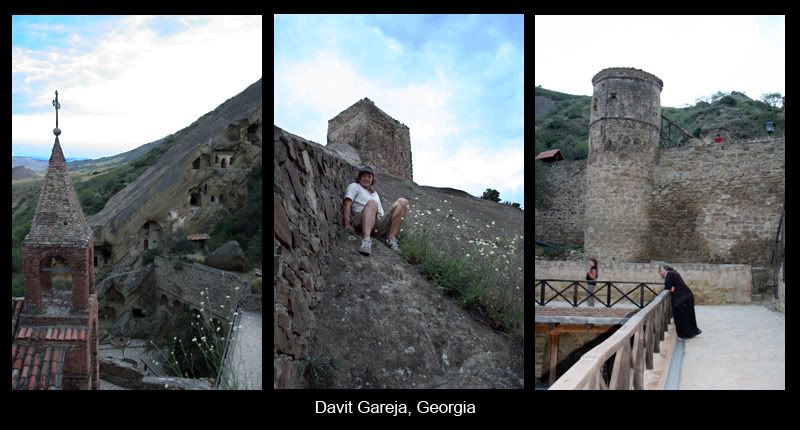
St David founded a Christian church in a cave at the site in the fourth century, and it has been an important Church ever since.
At its peak 6,000 monks lived at Davit Gareja. But in the 16th Century the Shah of Iran took an army to the place and slaughtered them all.
Now 45-year-old Padre Antimoz lives there with three other monks and a few ‘guests’. A bridge engineer during Soviet times, 20 years ago Padre joined the ‘spiritual academy’ and became what he calls an ‘air monk’. He has lived in a cave for the past four years, just at St David did.
He showed us around the main church by candlelight. The grave of St David lies in there, and a fresco dedicated to the 6,000 slaughtered monks.
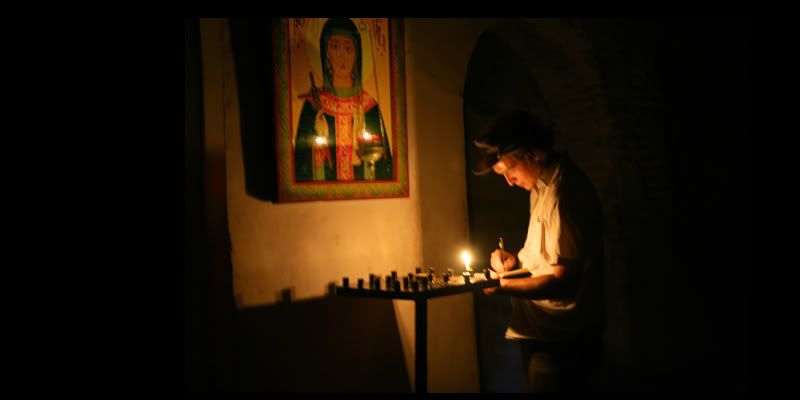
I was stunned when Padre explained that one painting depicted St George slaying the dragon. The dragon wasn’t the winged, tailed beast of English legend, but a armoured man of Asian descent.
According to Padre this ‘Dragon’ was a Byzantine soldier who was loyal to Pagan Rome at a time when the Emperor Theocritian (Theocletio) worshipped Zeus and hated Christians. He had killed ‘many, many Christians’ Padre said, and so earned the name ‘Dragon’.
But George, a Turk from Kapadoccia, slayed him in 303AD, earning sainthood.
It was strange to hear the story of England’s patron saint, told from this side of the world. Padre had no idea what links George to my island.
It was late and Padre offered us a place to stay, but we were behind schedule and needed to press on to the border, so we said our goodbyes.
Within a few hours Fez had broken down, he would run, but wouldn’t start. No big deal as push starting the light little fellow is a simple process (we have got to the stage where we can reverse push start a Trabbi against traffic up a hill).
Standing by the side of the road while TP checked Fez’s engine, tired and hungry in the Georgian night, a truck saw us and pulled over. The driver stepped out and gave us three giant watermelons, then drove off into the darkness. The gift raised morale, brightening everyone’s mood and we messily gorged ourselves in front of Ziggy’s headlights.
Within a couple of hours of leaving, Gunther the Mercedes got a flat. His fourth in a month. We think he may be overloaded.
Every passer by stopped to help despite it being the early hours of the morning, then, when we’d finally replaced the wheel, after struggling with the jack on uneven ground, the hydraulic suspension failed. We decided to limp on to the border and try to tackle the problem there, but the last 100km took two and a half hours to cross.
We rolled into the checkpoint and the guards slowly came to life. One went around kicking lampposts to get them to work. We showed our papers, chatted a while, then an official in his early thirties, with dark hair and a handsome face, called me to one side conspiratorially.
“Hey Dan, come here.”
For a second I thought he was going to demand money to let the Merc through – old Gunther was clearly broken – but from somewhere he magiced up a giant, dusty, plastic container of syrupy, brown liquid.
“Take this,” he slid it towards me in the shadows, “Georgian wine. My friend in Karkheti made it. It is the best around.”
I was overwhelmed.
We had always planned on tasting the famous delicacy, but ran out of time. Once again Georgian hospitality left me stunned.
“I'm sorry we only have five litres to give you. Drink it. Drink too much you will be drunk.”
Maybe he knew we had a long night ahead of us.
It took eight hours to cross the 100m border, but that tub of bitter moonshine made it all bearable.
Georgian hospitality.
Next Azerbaijan:

Ends
mrdnmurdoch@gmail.com

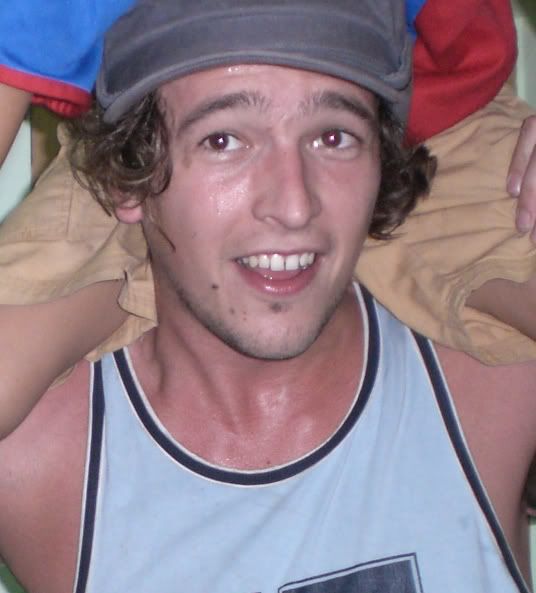
3 comments:
that photo of the trabbi and the horse is amazing- i love it!
I agree that photo with the horse is amazing.
I would like to exchange links with your site www.blogger.com
Is this possible?
Post a Comment